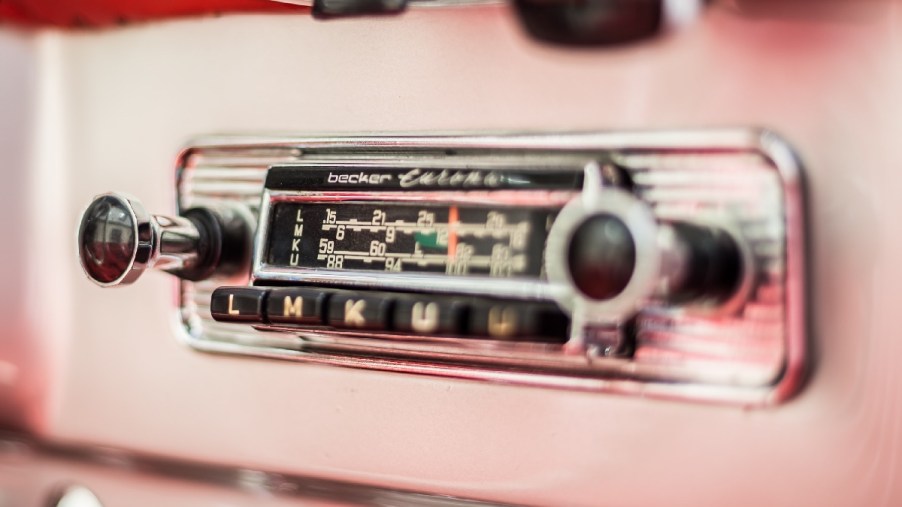
Electric Cars Could Kill AM Radio: End of the Road?
The rise of EVs signal a new era. With the new technologies in electric cars, various aspects of people’s lives will be altered. This includes an old technology — and a different kind of signal: AM radio. Electric cars could kill AM radio in the future. Is this the end of the road for AM radio? Will it die away in an EV world?
Automakers are dropping AM radio from EVs

Most new endeavors come with a mix of good and bad, benefits and trade-offs. That’s the nature of change. Electric cars exemplify this phenomenon. On the one hand, EVs have many advantages over gas-powered ones. This includes zero emissions, better performance, higher efficiency, less maintenance, and a quieter ride.
Conversely, at least for now, electric cars typically have a lower driving range and cost more than gas-powered ones. Also, with the EV mandates, many diehard car enthusiasts are not too happy about seeing their beloved internal combustion engine cars go away.
Along with killing off some iconic gas-powered cars, EVs could cause the death of another longtime medium beloved by many drivers. Drivers have been listening to AM radio for nearly a century. Whether listening to talk radio, the news, the weather, sports, or traffic information, AM radio has long been an integral part of people’s drives.
However, with the rise of EVs, AM radio could be a thing of the past, for automakers are dropping it from their electric cars. Tesla, BMW, Porsche, Audi, and Volvo removed AM radio from their EVs, along with Volkswagen with the ID.4 crossover SUV. Also, Ford said that it would drop it from the 2023 F-150 Lightning electric pickup truck.
With the EV mandates and many automakers planning to go all-electric, EVs will likely supplant gas-powered cars in the coming decades. Considering that a huge part of the AM listening audience is drivers, this could make it difficult for AM stations to be profitable.
AM radio removed from electric cars due to electromagnetic interference

Millions of drivers still listen to AM radio, so the removal of it from electric cars is not due to dwindling popularity. The removal is because of electromagnetic interference (EMI). As detailed by the New York Times, automakers claim that EVs produce more electromagnetic interference than gas-powered cars.
Unfortunately, this electromagnetic interference can disrupt the reception of signals from AM radio stations. This causes such problems as noise, static, and a high-frequency hum. However, it’s not a significant problem for FM signals, which are more resistant to EMI.
In a statement, BMW stated, “Rather than frustrate customers with inferior reception and noise, the decision was made to leave it off vehicles that feature eDrive technology.” The eDrive system is the technology that BMW uses in its electric cars.
Millions of Americans could lose access to AM radio — and emergency broadcasts

Around 47 million Americans listen to AM radio — many of whom do so while driving their car, according to Nielson, the media data tracking firm. Also, AM radio listeners tend to be older, with around a third of them over the age of 65. Furthermore, the amount of time spent listening to AM radio has increased to two hours per day over the past five years.
Along with its popularity, AM radio has some benefits over FM radio. For one, AM radio signals can travel farther than FM radio — and as a result, can reach more listeners. Also, AM stations are typically cheaper to operate than FM stations. Because of this, programming for AM radio can be targeted toward niche audiences, such as specific cultural or religious communities.
Furthermore, AM radio is used for emergency transmissions. This includes news reports for such things as hurricanes, flash floods, tornadoes, and other severe weather. Recently, Edward J. Markey, U.S. Senator from Massachusetts, sent a letter to 20 automakers requesting them to keep AM radio in EVs.
In his letter, Markey cited public safety: “Despite innovations such as the smartphone and social media, AM/FM broadcast radio remains the most dependable, cost-free, and accessible communication mechanism for public officials to communicate with the public during times of emergency. As a result, any phaseout of broadcast AM radio could pose a significant communication problem during emergencies.”
Are there technological solutions in EVs that could prevent the death of AM radio?
The electromagnetic interference from electric cars disrupts the reception of AM signals. However, is there a technological solution that could overcome this problem? According to Pooja Nair, a communications systems engineer, it’s not an insurmountable problem. EMI could be controlled via shielding filters and cables, as well as the delicate placement of the EV components in the vehicle.
However, these modifications are costly and require more time and resources. It’s unclear if automakers would be willing to spend more to build electric cars to satisfy AM radio listeners. Also, most electric cars are already expensive, so raising the price to cover these modifications would make them even more unaffordable. Also, while AM radio is popular in America, people in other markets, including Europe, don’t listen to it as much.
Most modern cars offer the ability to stream AM on apps. However, if you don’t have access to the internet, whether via in-vehicle Wi-Fi or a smartphone, this is not an option. Another possible solution is to transfer AM radio to FM radio. However, as mentioned earlier, this results in losing out on multiple benefits of AM signals compared to FM ones, such as lower cost and a wider audience reach.
Electric cars have a wide array of benefits, but like most new endeavors, they come with some sacrifices. For many drivers, this could mean the loss of their beloved AM radio.
How does this make you feel? Can you roll with the changes — or does the potential death of AM radio on your drives fill you with frustration?


